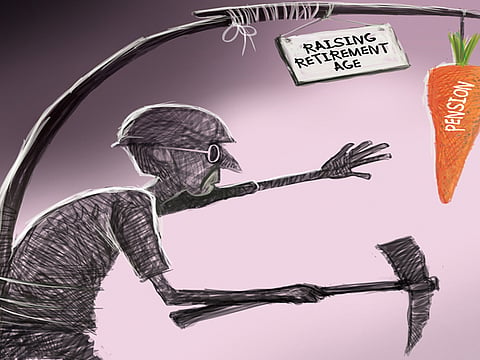Controlling the cost of future pension payouts
Raising the retirement age will not be a long-term solution to meet funding targets

I once posed a question on Twitter on the possible trade-off between higher pension payouts and lower unemployment. The relationship is not straightforward, where by lowering one the other automatically goes up.
My assumption is that higher pension payouts can contribute to lower unemployment rates. Countries that haven’t raised the retirement age are looking to do so as to avoid having to start paying out retirement packages to aging populations.
The Organisation for Economic Co-operation and Development (OECD), or as some like to call it “the club of rich countries”, estimates retirement age in the UK to be 69 years by 2040, and by 2050 in Italy and Denmark. It also estimates the retirement age in the US and in Germany would be 67 years by 2050.
Why? Because US pension schemes are 84 per cent funded, while in the UK it would be 91 per cent (The Economist, 2014). According to the UK government, as was quoted by CNN Money, raising the retirement age “will save £500 billion [Dh2.98 trillion] over 50 years”.
The logic centres on savings. Or, if rephrased, the savings come from deferred payouts, which might otherwise add to additional costs if more age groups are to join the initial ones.
One main consequence of raising required retirement age is that it leads to higher unemployment rates among young people, almost consistently higher than the given country’s average unemployment rate. The reasoning here is simple.
With the delay in retirement, the turnover for existing jobs is kept low and markets cannot rally themselves into creating enough new ones, especially in a post-financial crisis era. “In the developed world, 18 per cent of people aged 16-24 are jobless” (Project Syndicate, 2014).
The rate stands at 16 per cent in the US and 20 per cent in the UK, more or less. According to the Euro Stat News Release, as of May 2014, “5.187 million young persons [under 25 years] were unemployed in the EU28”. Unless some sort of a miracle comes along to create enough jobs for all of them, raising retirement ages is no way to sort out the dilemma.
Thailand, Singapore, and Hong Kong boast the lowest three unemployment rates at 0.62 per cent, 1.8 per cent, and 3.2 per cent respectively. And what are the retirement ages? 60, 62, and 60 years respectively.
It is not necessarily true that lower required retirement ages are linked to lower unemployment rates but, if anything, they contribute to higher turnover in jobs. I am not suggesting here that retirement age be lowered. Instead, I am attempting to figure out a couple of ways to increase the turnover rate.
One of these would be guaranteeing higher pension payouts to encourage people to retire ahead of the required retirement age. In terms of financial implications, there is almost no single pension fund which is not underfunded in one way or another. This is also the reason why countries mentioned earlier have either increased the minimum required retirement age or are looking into it.
Nevertheless, underfunding will never be resolved with the close to zero interest rates that central banks are using as a way out of recession, or double- and triple-dip recession.
It might not be feasible for governments to channel higher contributions when they can’t make the current ones, which is the reason why pension funds are underfunded. And that is why minimum retirement ages are raised, and probably will be raised again.
In an earlier article, I suggested having a clear system that enables employees to check their retirement status in terms of future payout. Based on that, they are given the option to contribute higher during their employment years to receive their target retirement salary at their target retirement ages.
I am inclined to believe that not everyone in a given age group would want early retirement to maintain a certain daily routine, or enjoy benefits they wouldn’t have upon retirement. Anyways, pension adjustment could be applied for new pension joiners and specific younger age groups to take a first step towards the future and long-term pension reforms.
Voluntary early retirement will not only help lower unemployment, but will cut government expenses directly by decreasing unemployment related payouts. It will also maintain retirees’ standards of living, while keeping spending and consumption at par.
Now the thought I want to leave you with is this: how well does increasing the minimum required retirement age work with higher life expectancies?
— The writer is a commercial consultant and a commentator on economic affairs. You can follow him on Twitter at www.twitter.com/aj_alshaali
Sign up for the Daily Briefing
Get the latest news and updates straight to your inbox



